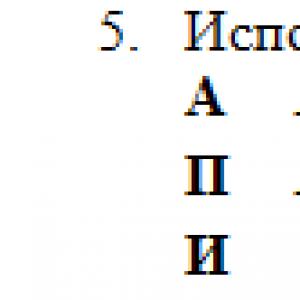The verb Come: verb forms, pronunciation, use with prepositions. The verb to come in English and its meanings Irregular form of the verb come
In the past tense, the verb after any pronoun comes in the same form - with the ending - ed - or completely changes its shape. In the first case, we are dealing with regular verbs whose endings - ed . In the second case, we are faced with irregular verbs.
You cannot add to them - E.D. , because in the past tense these verbs change completely.
This is exactly what we are seeing with do. It's not in the past tense done (as it should be according to the rule), and did , because do - This irregular verb.
So how do you determine whether a verb is regular or not?
A little “female” logic will help us here: you just need to learn the table of irregular verbs and their translation. Those not on this list are correct. But the catch is that there are about 200 irregular verbs! And multiply this number by 3 (an irregular verb has 3 forms: one is the present tense, the second is the past tense, the third is the participle). However, the list of necessary everyday life verbs are not so extensive - almost 2 times less. You need to know them first of all.
How to remember irregular verbs?
Repeat out loud 3 forms of each verb, so they are perfectly remembered - like a rhyme! Or print out a book to quickly memorize irregular verbs ().
Table of irregular verbs with translations
Table. Irregular verbs with translation
| Present tense | Past tense | Communion | Translation |
| 1. awake | awoke | awoken | wake up |
| 2.be | was, were | been | be |
| 3. beat | beat | beaten | beat |
| 4. become | became | become | become |
| 5.begin | began | begun | start off |
| 6. bend | bent | bent | bend over, bend over |
| 7. bite | bit | bitten | bite |
| 8.blow | blew | blown | blow |
| 9. break | broke | broken | break |
| 10. bring | brought | brought | bring |
| 11.broadcast | broadcast | broadcast | broadcast |
| 12. build | built | built | build |
| 13. burn | burned/burnt | burned/burnt | burn, burn |
| 14.buy | bought | bought | buy |
| 15.catch | caught | caught | catch |
| 16. choose | chose | chosen | choose |
| 17. come | came | come | come |
| 18. cost | cost | cost | cost |
| 19.cut | cut | cut | cut |
| 20.dig | dug | dug | dig |
| 21. do | did | done | do |
| 22.draw | drew | drawn | 1. draw 2. pull |
| 23. dreams | dreamed/dreamt | dreamed/dreamt | dream |
| 24. drive | drove | driven | manage |
| 25.drink | drank | drunk | drink |
| 26. eat | ate | eaten | There is |
| 27. fall | fell | fallen | fall |
| 28.feel | felt | felt | feel |
| 29. fight | fought | fought | fight |
| 30.find | found | found | find |
| 31.fly | flew | flown | fly |
| 32. forget | forgot | forgotten | forget |
| 33.forgive | forgave | forgiven | forgive |
| 34. freeze | froze | frozen | freeze |
| 35.get | got | gotten | receive |
| 36.give | gave | given | give |
| 37.go | went | gone | go |
| 38.grow | grew | grown | grow |
| 39.hang | hung | hung | hang |
| 40. have | had | had | possess, have |
| 41. hear | heard | heard | hear |
| 42.hide | hid | hidden | hide |
| 43. hit | hit | hit | hit |
| 44. hold | held | held | hold |
| 45. hurt | hurt | hurt | hurt |
| 46. keep | kept | kept | keep |
| 47. know | knew | known | know |
| 48. lay | laid | laid | put |
| 49.lead | led | led | lead |
| 50. learn | learned/learnt | learned/learnt | learn |
| 51. leave | left | left | leave |
| 52.lend | tape | tape | lend |
| 53.let | let | let | let |
| 54.lie | lay | lain | lie |
| 55. lose | lost | lost | lose |
| 56. make | made | made | do |
| 57. mean | meant | meant | mean |
| 58. meet | met | met | meet |
| 59.pay | paid | paid | pay |
| 60. put | put | put | put |
| 61. read | read | read | read |
| 62. ride | rode | ridden | ride a horse |
| 63. ring | rank | rung | call |
| 64.rise | rose | risen | get up |
| 65. run | ran | run | run |
| 66. say | said | said | say |
| 67. see | saw | seen | see |
| 68. sell | sold | sold | sell |
| 69. send | sent | sent | send |
| 70. show | showed | showed/shown | show |
| 71.shut | shut | shut | close |
| 72. sing | sang | sung | sing |
| 73. sit | sat | sat | sit |
| 74. sleep | slept | slept | sleep |
| 75.speak | spoke | spoken | talk |
| 76. spend | spent | spent | spend |
| 77.stand | stood | stood | stand |
| 78. swim | swam | swum | swim |
| 79. take | took | taken | take |
| 80. teach | taught | taught | teach |
| 81.tear | tore | torn | tear |
| 82. tell | told | told | tell |
| 83. think | thought | thought | think |
| 84.throw | threw | thrown | throw |
| 85. understand | understood | understood | understand |
| 86.wake | woke up | woken | wake up |
| 87. wear | wore | worn | wear |
| 88. win | won | won | win |
| 89. write | wrote | written | write |
In order to express several different actions, sometimes there is no need to use many verbs, since many of them are capable of conveying different shades and states, usually expressed by prepositions. One of these words is the irregular verb come, which is one of the most common lexical units that display action. Accordingly, the forms of the verb come, as well as the maximum possible shades with it, need to be considered in more detail.
Basic characteristics of the verb
Numerous examples of expressions with come prove that this word is capable of expressing not only its main meaning - “to come, to come” - but also many others.
This structure is pronounced simply: the pronunciation of both main varieties of English (British and American) in this case is the same. The transcription will be as follows: .
This form has no modal shades, but as for the phrasal meaning, here you can find a lot of translation options, and most cases will have nothing to do with each other:
- Why did he decide to come out? –Why He decided publicly speak?
- Don't try to come up with an idea, just follow the instructions attached –Not try come up with new idea, Just follow attached instructions
Temporal verb forms
The conjugation of this verb is characterized by non-standard formation of forms; Other irregular verbs have the same feature. As in most other situations, the second and 3rd forms will not coincide, and the 3rd form of the verb is characterized by duplication of the first. More simply, you can display the entire circuit like this: come – came – come.
It is logical to assume that this action word has three main time frames: Present, Past and Future. It is worth noting that there is no special structure for the future tense; the form will remain first. The past tense forms the 2nd form of the verb – came:
- He came late yesterday, which was strange enough –Yesterday He came late, What was enough Weird
- They came last week, and tomorrow they are returning home– They arrived last week and tomorrow they plan to return home
- Has he already come along with us? –He already agreed With us?
In addition, there is also long-term verb form come, which is formed by adding the ending –ing:
- Is aunty coming with us? –Auntie coming With us?
- Don't open the door, they're coming – Not open door, They are coming
Interrogative sentences
This verb does not have the ability to act as an auxiliary, it can only be independent. Consequently, the rule for forming a question does not provide for the placement of this verb in the first place, as is the case with auxiliary verbs or modals. In such sentences it will come after the subject, and the first place will be taken by either an auxiliary or an additional question word:
- Did you come across him in that center? –You came across on him V volume center?
- Why has Jake come? No one has invited him –Why came Jake? Nobody invited him
Negative sentences
The situation with denial is the same as with questions. Due to the fact that this lexical unit does not have an auxiliary meaning, simply adding the particle not to it will not work. In order to correctly compose a negative sentence, you need to use a suitable auxiliary verb, adding not to it:
- He didn't’ t come over us as he had a lot to do with his job– He didn’t join us because he had a lot of work-related things to do.
- Susie will not come , I suppose, so we can start without her- I guess Susie won't come, so we can start without her.
Like Phrasal verb
As already mentioned, the verb come can be part of the set set expressions. Being a full-fledged phrasal verb, this structure takes on different meanings and translations depending on the preposition that is adjacent to it. Among the popular sustainable designs with this word are the following:

All these specific features make this verb a special verb with many possible meanings and the ability to be used in a wide variety of tense forms. Knowing these nuances will help you diversify your speech with various set expressions and get as close as possible to the level of a native speaker.
In today's material we will look at the phrasal verb come. This is an irregular verb, that is, the formation of the past tense of the II and III forms of the verb does not occur according to the usual rules, when the ending -ed is added to the word, but is formed according to special rules that need to be known by heart - come - came - come. The main meaning of the verb come is come, arrive, arrive.
- We are closed, come tomorrow. - We are closed come Tomorrow.
But depending on the context, it can acquire variable shades of meaning, the translation of which cannot be translated by an online dictionary.
Join
- We'll go for a walk. Do you want t o come ? - We're going for a walk. Want join?
Reach, take a position
- If Alex comes first, he‘ ll win a grand for study. – If Alex will take first place (comes first), he will win a training grant.
To be a consequence, to attack(after something)
- The rainbow almost always comes after the rain, when it‘ s sunny. – A rainbow almost always appears (comes) after rain, when it is sunny.
To be available, to be available
- The dress comes in red, green and blue. –Dress available V red, green And blue flowers.
get around, stand
- This flat comes much expensive, we can not allow it now. - This apartment it will cost too expensive, we can't afford it now.
In addition, there are more than 30 combinations that produce phrasal verbs with adverbs and prepositions, and which are capable of taking on the most unexpected meanings. Exercises will help you determine the specific meaning of the phrase.
Phrasal verb come is one of the most difficult to study, because, depending on the verbal environment, it can take on a lot of meanings: from get sick(come down with ) to come up with anything ( come up with ).
Let's look at the most popular combinations of “verb+” adverb" and "verb + pretext”, which will help you learn to understand your interlocutor when communicating. Next, do strengthening exercises.
COME ABOUT
To appear, to arise
- The idea traveling around the world came about when I saw the beauty of the nature of my own country. –Idea travel around peace arose , When I saw beauty nature own countries.
COME ACROSS
Accidentally meet, stumble upon
- I came across this book by chance, but it changed all my life. –I accidentally came across on this book, But she changed all mine life.
To be understood, to be perceived
- It was very difficult to come across his mind. –Was Very difficult his understand .
To make an impression, to appear
- He comes across as handsome and kind man, but it‘ s just a mask which hides his true face. - He Seems cute and kind person, but this is just a mask that hides his true face.
convey, express(thoughts, ideas)
- Can you come across clearer? –You you can express yourself clearer?
- I don't always come across with consistency.– I don’t always express my thoughts consistently.
Fork out, be generous
In this sense phrasal verbs come + across used colloquially when talking about money.
- Do you want this dress? Come across! You can't deprive yourself of such pleasure. –You Want This dress? Fork out ! You can't deprive yourself of such pleasure.
COME AFTER
Ppursue
- The murderer came across him from the station, waiting a perfect moment to attack. –Murderer pursued his from stations, waiting ideal moment For attacks.
COME ALONG
Accompany someone , keep company
- I‘ m going to meet with Tim, come along with me. - I'm going to meet Tim, make up to me company.
get better, get better
- Doctor said that I come along , so I can get back to work. - The doctor said that I I'm getting better, so I can get back to work.
The verb is used colloquially to mean good, stop, that's enough.
- Oh, come along! – Enough for you.
COME APART
Rcollapse, fall apart
- The house came apart at the seams. –House was falling apart on eyes.
COME AROUND
Come in, come in
- Next week I‘ ll be in London and try to come around to Susan. - I'll be in London next week and try stop by to Susan.
advance, happen
- The day of wedding came around so quickly, that I even had not time to recognize my decision. –Day weddings arrived So fast, What I even Not managed realize yours solution.
Change your mind
- John came around after conversation with Sally. –John changed solution after conversation With Sally.
synonym: change one's mind
The phrasal verb come around is also used in maritime vocabulary to mean “ turn right." In the modified form come round/ to is used to mean come to life(after fainting, illness).
- Katy couldn't‘ t came round after Harry‘ s death for a long time. – Katie couldn’t for a long time come to your senses after Harry's death.
COME BACK
Come back
- Come back soon, I‘ ll miss you. – Come back rather, I will miss you.
COME BETWEEN
Interfere(about relationships)
Never come between lovers, you‘ ll be bad anyway. - Never interfere in a relationship between lovers, you will be bad in any case.
COME BY
Get it
- Don‘ t you know where the cheapest tickets come by ? – You don’t know where you can get it cheapest tickets?
Come in
The meaning came from the design-Americanism. More used in conversational form. Can be used as a synonym for come around.
- I made cakes by mom's recipe. Would you like come by ? – I baked cupcakes according to my mother’s recipe. Don't want to come in?
COME DOWN
Get down(from the top floor, tree, mountain)
- Kids, come down. The dinner is waiting for you. –Children, come down . Dinner is waiting for you.
decrease
- I always buy shoes at the end of the season when the prices come down. – I Always I'm buying shoes V end season, When prices decrease .
Fall
- The old tree came down from wind in the central square, but no one hurts. – Old tree fell from the wind in the central square, but no one was injured.
COME DOWN WITH
Zget sick
- Many children came down with flu this autumn. –Many children got sick flu this in autumn.
COME DOWN ON
Criticize, condemn
- Don't dare come down on me! –Not dare condemn me!
COME FORWARD
Intercede, protect, give information
- He asked about help, but nobody wanted to come forward . – He asked for help, but no one wanted speak up in defense.
COME FROM
To occur, to be born
- Nick comes from Greece. – Nick originally from from Greece.
COME IN
Login
- Come in and take your sit. –Come in and take your place.
Come in power
- They came in to develop our company. - They came to power to develop the company.
COME OF
To be a result, to follow from something
- Don't give up. I think something good will come of it. - Don't give up. I think from this it will work out something good.
COME OFF
Peel off, fall off
- It's time to change the wallpaper. It comes off . - It's time to change the wallpaper. They peel off.
COME ON
To advance, to approach
- The winter comes on. We must think how to pay for the flat. –Winter approaching . We have to think about how to pay for the apartment.
Move forward, make progress
- How does the work on your thesis coming on? – How progressing Job over yours dissertation?
Also a combination Come on! used colloquially to mean come on, do it, decide, quickly etc.
COME OUT
Go out, go out, be in public
- I'll be soon. I'm come out. – I soon will. I I'm going out.
Go out, realize yourself, publish(about a book, TV series, album)
- I’m waiting when the new season “Game of Thrones” comes out. – I I am waiting, When will come out new season « Games thrones».
COME OVER
Leave, move(to another country)
- Maggie came over to Italy many years ago. –Maggie moved V Italy many years that.
To be perceived, to make an impression
- No one could came over him what he was. - No one could perceive him the way he was.
COME THROUGH
endure, endure, pass(through something)
- She came through the loss and disappointment, how could she believe in the light future after that? –She survived losses And disappointment, How she could believe V light future after this?
COME TOGETHER
Unite
- The best way to get a win – come together. – Best way win – unite .
COME UP
Rise, increase
- The world ocean level is coming up because of global warming. –World sea level rises due to global warming.
Rise, stand on your feet
- He came up very quickly. –He got up very quickly.
Be mentioned
- Dr. Smith, it’s honor for us to meet you. We came up about your works yesterday. – Dr. Smith, it is an honor for us to meet with you. We mentioned your work yesterday.
Approach(about the event)
- The storm is coming up. We need to hurry up. –Storm approaching . We need to hurry up.
COME UP AGAINST
confront, confront
- When it seems that you come up against with insuperable difficulties, remember the way that you already went through. It‘ ll help you to find strength. – When it seems that you collided with insurmountable obstacles, remember what you have already been through. This will help you find strength.
COME UP WITH
Come up with(something)
- Good job, Den! You come up with a great idea. –good Job, Dan! You filed great idea.
COME UNDER
Be exposed to(attack, criticism, pressure)
- All our actions come under cruel criticism of jealous people. - All our actions are exposed harsh criticism from envious people.
Today in our article we will introduce you to one multifunctional word: came (come). This verb has different forms depending on tense, is used in a variety of phrasal structures and deserves our close attention.
General concept of a verb
First of all, it is necessary to describe its main qualities as a simple semantic verb that performs the function of a predicate in a sentence. How semantic verb come is translated “to come, to arrive,” but this is not the entire list of possible options. So you can see how different the translation can be of this word in the sentence, we offer several examples:
- He comes here every day. - He comes here every day.
- I will come in 2 days. - I I'll come in 2 days.
- She came to some unknown organization. - She entered to an unknown organization.
- It always comes in the night. - It always appears at night.
- This dress comes to your bag. - This is a dress fits to your purse.
Came (come) is an irregular verb, but for those learning English, it means a lot. This means that when forming temporary formulas, he uses his own forms, and does not obey the general rule. So, in the table where all such words are entered, three options are given: come-came-come.
- I came here yesterday. - I came here yesterday.
By type, this verb is weak. Thus, when forming negative and interrogative sentences, he needs the help of auxiliary verbs. Depending on the time, the do, does or did assistants are selected.
- They didn't come to the party. - They didn't come to the party.
- When does Ben come to work? - When does Ben come to work?
In addition to performing a simple semantic function, this verb can be used as part of a phrase. There are many set expressions in which we observe its presence, and the translation of these sentences does not always coincide with the main meaning.
- Please, come back and I will forgive you. - Please come back and I will forgive you.
Temporal forms of the verb come with examples
IN English There are four different groups of tenses:
- indefinite - Indefinite,
- long - Continuous,
- completed - Perfect,
- completed continuous - Perfect Continuous.
As already mentioned, the came/come form also changes depending on time. The verb is modified according to the following formulas:
Group/time | Present | Past | |
Uncertain | |||
Long-term | am/is/are coming | ||
Completed | |||
Completed continuous | have/has been coming | will have been coming |
Each of the formulas is applied strictly according to the rules for forming tenses:
- I come here every Tuesday. - I come here every Tuesday.
- We came here every Tuesday. - We came here every Tuesday.
- We will come here every Tuesday. - We will come here every Tuesday.
- At the moment she is going inside. - She is coming in at this moment.
- At that moment she went inside. - She was coming in at that moment.
- At 5 o'clock she will go inside. - She will be coming in at 5.
- They've already arrived. - They have already come.
- His parents arrived before he left. - The parents had come before he left.
- We will arrive at that moment. - We will have come by that moment.
- Despite his efforts, we did not come to an agreement for a long time. - In spite of his efforts we have been coming to agreement for a long time.
- At ten o'clock we had already done long haul to your destination. - At 10 o’clock we had been coming a long way to destination.
- By 5 o'clock he will have already returned to work twice, as he constantly forgets something. - By 5 o’clock he will already have been coming back to work twice for he constantly forgets something.

Set phrases
As a phrasal verb, come is part of many expressions. Among the most common:
- “... about” - to arise;
- “... across” - meet, collide;
- “... along” - go together;
- “... back” - return;
- “... down” - fall, get sick;
- “... forward” - to speak out in defense;
- “... from” - to be from;
- “... in” - to enter;
- “... on” - begin, happen;
- “... out” - appear, etc.
For example: I often come across him in the library. - I often meet him in the library.
Cam/come verb training
The verb is best trained in exercises such as:
- Insert the desired form of the verb (He ... to the cinema in time).
- Insert the appropriate preposition of the phrasal verb (They often ... ... with difficulties).
- Translate into English (You came too late today).

There are many exercises for practicing English verbs, you just need to have the desire to learn. To practice phrasal verbs, it is optimal to use translation sentences. Here is an example of such sentences:
- We let's move on street only when the light is green.
- He always should behind us.
- He should appear before the court.
- Great wine it worked from this grape variety.
- We came out from home on time.
- Scream broke out from his chest.
- What is this found at him?
- Not turn around the corner, but go straight.
- It is forbidden hit under someone else's influence.
- I came across for interesting information.
- And here suddenly at her attacked fear.
- This is all is happening not with me.
- What a pity that everything fell apart into pieces.
- Never again come back.
- Don't worry, that's it will pass.
Despite such different translation options into Russian, all sentences use the same verb come, but with different prepositions and adverbs.







